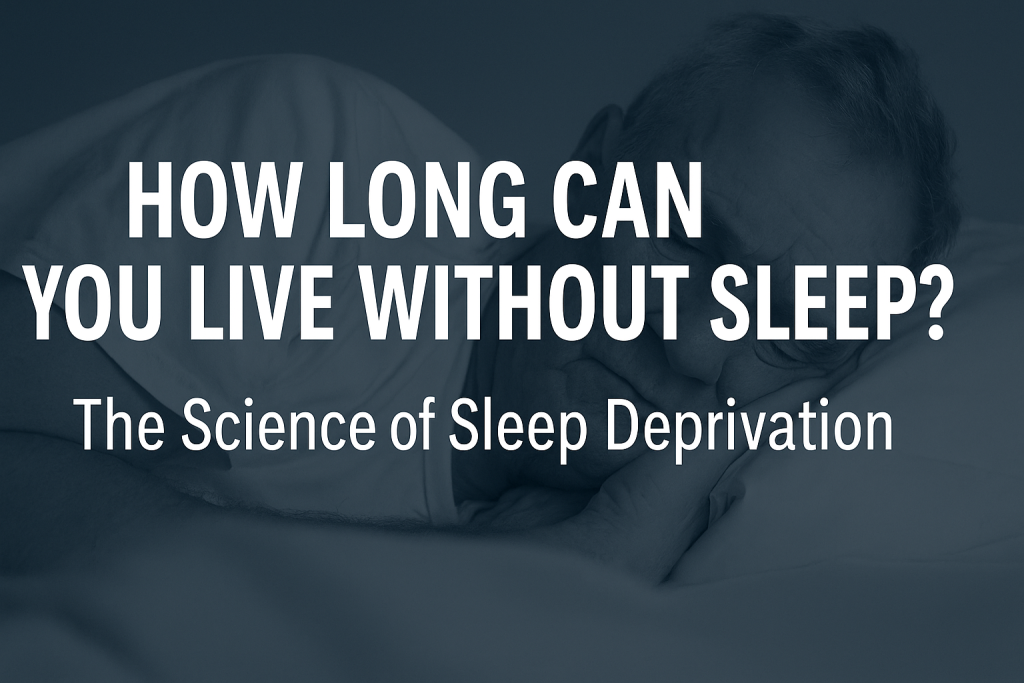Sleep is one of the most basic and essential needs for all humans. But how long can you live without sleep? While it’s common to hear stories of people bragging about pulling all-nighters, the consequences of going without sleep for extended periods can be severe—and even deadly. In this article, we’ll delve deep into the science of sleep deprivation, how long you can survive without sleep, the effects of missing sleep on your health, and why sleep is absolutely essential for survival.
Why Do Humans Need Sleep?
Sleep is a fundamental physiological process, just like eating and breathing. During sleep, your body and brain undergo critical repair and maintenance tasks. From memory consolidation and emotional regulation to immune system boosting and cellular repair, sleep is crucial for optimal functioning.
- Brain health: Sleep allows your brain to form new neural pathways and clear out toxic byproducts accumulated during waking hours.
- Physical restoration: Growth hormone is primarily released during sleep, aiding in tissue repair and muscle growth.
- Emotional balance: Sleep deprivation can lead to irritability, mood swings, and impaired judgment.
- Immune function: Chronic lack of sleep suppresses the immune system, making you more susceptible to illness.
What Happens When You Don’t Sleep?
Even a single night of missed sleep can make you feel groggy, less alert, and more prone to making mistakes. But what happens when sleep deprivation continues for days or even weeks?
Short-term Effects (24-48 hours without sleep)
- Impaired cognitive function: Memory lapses, poor concentration, and slower reaction times.
- Mood changes: Increased anxiety, irritability, and even mild hallucinations.
- Physical symptoms: Headaches, muscle aches, and gastrointestinal distress.
Medium-term Effects (48-72 hours without sleep)
- Severe cognitive deficits: Difficulty speaking, remembering simple tasks, and maintaining focus.
- Micro-sleeps: Brief, uncontrollable episodes of sleep that last a few seconds.
- Hallucinations: Visual and auditory hallucinations become more common.
- Weakened immune system: You become highly susceptible to infections.
Long-term Effects (More than 72 hours without sleep)
- Paranoia and delusions: Severe mental disturbances, including paranoia and psychosis.
- Physical breakdown: Muscle tremors, speech problems, and compromised organ function.
- Risk of fatality: While death from sleep deprivation alone is rare, the risk of deadly accidents and life-threatening complications rises dramatically.
How Long Has Anyone Ever Stayed Awake?
The most famous record is held by Randy Gardner, a high school student who, in 1964, stayed awake for 11 days (264 hours) as part of a science fair project. Under close observation, Gardner experienced severe cognitive and behavioral changes, including mood swings, memory lapses, and hallucinations.
Since then, attempts to break the record have been discouraged by health professionals due to the extreme risks involved. The Guinness World Records no longer recognizes attempts to break the “no-sleep” record because of the associated dangers.
Scientific Studies on Sleep Deprivation
Laboratory studies on humans typically limit sleep deprivation to 2-3 days due to ethical concerns. Animal studies have shown that complete sleep deprivation in rats can lead to death within 2-3 weeks, usually as a result of immune system failure or organ damage.
Can You Really Die From Lack of Sleep?
While it’s rare for humans to die directly from sleep deprivation, the consequences of prolonged wakefulness can be fatal. Severe sleep deprivation causes the body and brain to become unable to function, resulting in increased risk of accidents, heart problems, and immune system collapse.
Fatal Familial Insomnia: A Rare Example
Fatal Familial Insomnia (FFI) is a rare genetic disorder that demonstrates the lethal consequences of total sleep loss. People with FFI eventually lose the ability to sleep, leading to severe mental and physical deterioration and, ultimately, death within several months to a few years.
Why Is Sleep Essential for Survival?
Your body cannot function without sleep in the same way it cannot survive without food or water. Key processes that occur during sleep are vital for your survival, including:
- Energy conservation and restoration
- Hormone regulation
- Detoxification of the brain
- Immune system strengthening
Without these processes, your body would break down over time, leading to multi-organ failure and eventual death.
How Long Can You Live Without Sleep?
While the exact limit varies from person to person, most experts agree that you would not survive more than 2-3 weeks without sleep. However, the severe cognitive, emotional, and physical effects would set in much earlier—usually within the first few days.
Factors Affecting Survival Without Sleep
- Individual health: Pre-existing conditions may make sleep deprivation more dangerous.
- Age: Young people and the elderly are most vulnerable to the effects of sleep loss.
- Stress levels: High stress can worsen the impact of no sleep.
- Duration and frequency: Chronic partial sleep deprivation can be almost as dangerous as acute total sleep loss.
Tips for Healthy Sleep
To avoid the severe consequences of sleep deprivation, prioritize good sleep hygiene:
- Maintain a consistent sleep schedule
- Create a dark, quiet, and cool sleep environment
- Avoid caffeine and screens before bedtime
- Practice relaxation techniques like meditation
- Aim for 7-9 hours of sleep per night
Conclusion
Sleep is not a luxury—it’s a survival necessity. While some people may brag about how little sleep they can function on, the truth is that your mind and body need regular, quality sleep to maintain health and longevity. The answer to “how long can you live without sleep” is sobering: just a few days without rest can lead to severe health effects, and complete sleep deprivation for more than two weeks can be fatal. Protect your health by prioritizing sleep every night.


